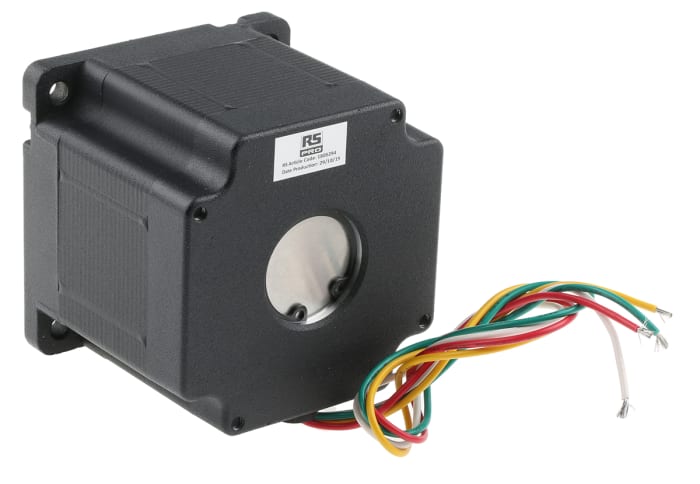RS PRO Unipolar Bipolar, Unipolar Stepper Motor 1.8°, 4.31Nm, 6.4 V dc, 2 A, 6 Wires

Technical documents
Specifications
Brand
RS ProShaft Diameter
14mm
Current Rating
2 A
Step Angle
1.8°
Depth
96mm
Standards Met
RoHS Compliant
Country of Origin
Taiwan, Province Of China
Product details
Stepper Motors With/Without Rear Shaft Extensions
RS Pro stepper motors with 6 or 8 lead configuration.
Features and Benefits
High quality
High reliability
Innovative
Advanced technology
Low noise and low vibration
Proper torque
Smooth run
Product Application Information
Computer controlled stepper motors are a type of motion-control positioning system. They are typically digitally controlled as part of an open loop system for use in holding or positioning applications.
In the field of lasers and optics they are frequently used in precision positioning equipment such as linear actuators, linear stages, rotation stages, goniometers, and mirror mounts. Other uses are in packaging machinery, and positioning of valve pilot stages for fluid control systems.
Commercially, stepper motors are used in floppy disk drives, flatbed scanners, computer printers, plotters, slot machines, image scanners, compact disc drives, intelligent lighting, camera lenses, CNC machines and, more recently, in 3D printers.
0.9° and 1.8° Hybrid Stepper Motors
1.8° Step Angle,The motors are directly compatible with the stepper motor drive boards and also drive either motor (if required) in the half step mode i.e. 0.9° per step resulting in higher resolution, greater performance stability and faster stepping rates. Direction, velocity, acceleration/deceleration can be controlled by a stepper motor controller.,Applying the correct electrical pulse sequence to the windings of the stepper motor results in a 1.8° step angle rotation of the spindle (i.e. 200 steps per revolution). When correctly loaded and driven these motors will produce discrete output steps. The number of steps and speed of rotation are determined by the number of pulses and frequency of the input signal. This provides an ideal method for speed and position control. The motors are directly compatible with stepper motor drive boards.,Applications include:
Stock information temporarily unavailable.
P.O.A.
1
P.O.A.
Stock information temporarily unavailable.
1
Technical documents
Specifications
Brand
RS ProShaft Diameter
14mm
Current Rating
2 A
Step Angle
1.8°
Depth
96mm
Standards Met
RoHS Compliant
Country of Origin
Taiwan, Province Of China
Product details
Stepper Motors With/Without Rear Shaft Extensions
RS Pro stepper motors with 6 or 8 lead configuration.
Features and Benefits
High quality
High reliability
Innovative
Advanced technology
Low noise and low vibration
Proper torque
Smooth run
Product Application Information
Computer controlled stepper motors are a type of motion-control positioning system. They are typically digitally controlled as part of an open loop system for use in holding or positioning applications.
In the field of lasers and optics they are frequently used in precision positioning equipment such as linear actuators, linear stages, rotation stages, goniometers, and mirror mounts. Other uses are in packaging machinery, and positioning of valve pilot stages for fluid control systems.
Commercially, stepper motors are used in floppy disk drives, flatbed scanners, computer printers, plotters, slot machines, image scanners, compact disc drives, intelligent lighting, camera lenses, CNC machines and, more recently, in 3D printers.
0.9° and 1.8° Hybrid Stepper Motors
1.8° Step Angle,The motors are directly compatible with the stepper motor drive boards and also drive either motor (if required) in the half step mode i.e. 0.9° per step resulting in higher resolution, greater performance stability and faster stepping rates. Direction, velocity, acceleration/deceleration can be controlled by a stepper motor controller.,Applying the correct electrical pulse sequence to the windings of the stepper motor results in a 1.8° step angle rotation of the spindle (i.e. 200 steps per revolution). When correctly loaded and driven these motors will produce discrete output steps. The number of steps and speed of rotation are determined by the number of pulses and frequency of the input signal. This provides an ideal method for speed and position control. The motors are directly compatible with stepper motor drive boards.,Applications include:
